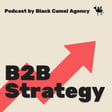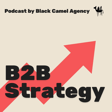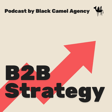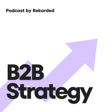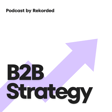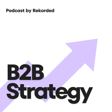Become a Creator today!Start creating today - Share your story with the world!
Start for free
00:00:00
00:00:01

14: How To Show Buyers You're The ONLY Choice (Category Design Series)
On the second of the Category Design series, we get answers to:
- how we clarify which problem we solve
- how framing the problem is the difference between the iPad and the failed competitors
- how to design a narrative that generates demand for your service and positions you to be different, not better
If you have more questions from this episode, John's Linkedin content goes into more detail: John Rougeux ⛰️ | LinkedIn
Transcript
Introduction to Fundamental Business Questions
00:00:00
Speaker
What problem do you solve? What is your point of view on that problem? How do you evangelize that point of view? These are questions that many people can't answer very easily, whether they're an agency founder, solopreneur, or a founder of a tech startup. And this results in a lot of different problems for you. But to name one of the biggest, you are perceived as interchangeable. We are living in a world where there is too much information and too many options for services. Without being able to answer these questions, there is no clear reason why a prospect will see why they should reach out to you and buy from you instead of the hundred others that are making very similar promises.
Crafting Unique Business Narratives
00:00:28
Speaker
Today in B2B strategies category design series, we're going to talk to John Ruji to figure out how to answer these questions, craft powerful narrative, put your message into action and show buyers why you're the only choice. So first, we're going to start with defining which problem we solve. After all problems are what create market categories. Second, we're going to determine which one of the five go to market strategies we will use. And third, how to develop a point of view or the narrative that shows why our company matters and is truly different.
00:00:56
Speaker
How do we clarify the problem we solve? It seems so simple and obvious, but trying to clarify this for myself and for clients, I know it's very, very difficult.
Identifying and Solving Business Problems
00:01:05
Speaker
So from your experience, how do you clarify the problem that we solve? Yeah, it's a good question. And it's, it's one that a lot of, I think founders wrestle with is there's so many unsolved problems, things that need to be addressed to have so many paths to go down. But the way I like to reframe the question a little bit and ask, you know, what question or what, what problem needs to be solved?
00:01:25
Speaker
And so one of the frameworks that I learned from my time with category design advisors is we try to look at what's changing the world. We call it changes in context. And the world is a pretty dynamic place. So we have things that are shifting all the time, like geopolitical conflict, interest rates. We have new technologies that are introduced. And the opportunity with that is all these changes create new problems.
00:01:52
Speaker
Those problems don't come with solutions. They need somebody to go out and solve them. That's where I like to start is, if there's a problem that's been solved by a bunch of solutions already, whether that's an agency, whether that's a software product or something else, if that's already a solved issue, then building a business around trying to solve that better than someone else is a tough road. I'm not saying you can't do it.
00:02:21
Speaker
not attractive to most founders and owners. I try to think about what's changing the world and what's remaining for somebody to go out and address and really build something around. Sometimes we can unpack this further if you like, but sometimes that's an entirely new problem. Other times, there's a niche or a buyer segment within
00:02:43
Speaker
you know, maybe they're stuck with kind of the status quo, the general purpose solution, but it's not really suited for them. And they've got some unique problems that you can go after. So maybe that's a long answer to your question, but, um, so where I think about it. So from personal experience, I think what I've had trouble with for myself, um, trying to figure out what problem I solve, how to clarify that, make sure I'm solving the right one is that I think that there's a problem with the word problem. So I think,
00:03:12
Speaker
In a lot of people's minds that aren't familiar with category design, problem can just simply mean symptom. So, you know, when someone comes to us, like I have a problem, I'm not getting enough sales, or so that's more, that's more of a symptom. So how do you, how do you differentiate what the problem is and the symptoms that are caused that come as a result of the problem? Do you have any way of thinking about that?
00:03:36
Speaker
Yeah, this would be my framework, but I found like the five whys framework is really useful to unpack that. So someone says, yeah, I'm not generating enough leads or enough business. That's a pretty universal problem, right? So framing and positioning your business around that.
00:03:54
Speaker
is too broad to really be interesting or unique to somebody. So we can start to ask, okay, why is that? And chances are, you're probably not gonna get a satisfactory answer at that question, but you really need to dig deep. And you might get, maybe it's something like, we'll just make something up, Dylan, like, oh yeah, the salespeople on my team aren't trained well enough to close clients when they're on a call. It's like, okay, why is that?
00:04:21
Speaker
We don't have any industry experience. Like we sell to, I don't know, medical labs. They don't know anything about medical labs, but we're asking them to sell the software. Okay, so, and then we're gonna get to that problem. Then we can figure out, okay, well, what can we do to fix this? Are we gonna go help you hire people from that industry to be your sales team? Are we gonna build a program to help train your sales team about this industry really quickly and get them up to speed?
00:04:50
Speaker
Is this something like how are people trying to solve that problem today? Is there a way to solve that or is this kind of just like a thing that you're stuck with? It's a good question you asked because that's normally how it shows up. People don't really understand the solution. Like you go to the doctor, I've got my shoulder hurts. 20 different things, right? That's your job is to like unpack that and figure out why.
00:05:17
Speaker
It's okay. Okay. So kind of see it like the way a doctor does by kind of figuring out the symptoms and then connecting the, the different pieces of the different data points to find the non-obvious problem kind of, is that what you're.
00:05:31
Speaker
going at?
Aligning Company Narrative and Messaging
00:05:33
Speaker
Yeah. I mean, maybe they know of the problem, but they didn't really, it might seem obvious to you from the outside. Sometimes when you, when you speak with folks, like they're so close to the issue that it's either they take it for granted or they haven't really looked at it with, with that fresh perspective. Um, so yeah, it might be a non-obvious thing, but it might be a thing that's just been sitting there all along. You just had to like uncover it and present it. Right.
00:05:59
Speaker
Yeah. Okay. And so with your own clients, the way after you clarify the problem that you solve, you have to determine the strategy, right? So from your website, you say that there are three things, three different strategies. So winning an emerging market, niching down or designing a category, right? So how do we determine what are the factors to consider there?
00:06:24
Speaker
Yeah, those are the three. I think there's actually five. We can unpack them if you like. So let me lay that out first because I think that'll give more context to your real question. So when you look at really any company, it doesn't matter if
Positioning in Emerging Categories
00:06:41
Speaker
it's an early stage startup or a publicly traded company.
00:06:44
Speaker
If you look at just the product itself they're building so I'm kind of oversimplifying this You know obviously some companies have multiple products or solutions, so I'm forget about that for a moment That solution. It's there's a there's a category that like should encompass that solution at some point in time So that's what we've got to figure out if you So there's let's kind of unpack those different scenarios
00:07:09
Speaker
There's one scenario where you're trying, you really need to like build and introduce an entirely new category. And this happens a lot less than I think people think.
00:07:20
Speaker
But you've built something that's just so novel, so different from anything else that exists in the world that really the only way to give it its due and to describe it properly is in the context of it entirely new. So we can call that pure category design, if you like. Segway is kind of a failed product, but it's an easy example for people to get. Because there's nothing really adjacent even to what a Segway is. It's just this totally new thing. Yeah.
00:07:48
Speaker
Okay, so that exists, but it's usually not the most common scenario. What's a little bit more common is, especially when you talk to early or growth stage startups, is there's an emerging space, an emerging category where you see a number of companies, they're kind of getting at the same thing.
00:08:11
Speaker
I like to use an example in B2B SaaS. There's a bunch of companies trying to turn partnerships into more of a software-driven process, a data-driven process. And everybody's got a different name or uses a different language for what this thing is. It's still kind of a nascent space. There's a lot of interest among early adopters, but it's not like a thing that every company is using yet.
00:08:36
Speaker
So if I'm talking to a company in that space, they don't need to develop and invent a brand new category. There's already the rough edges around it. So what they're really trying to do there is put themselves in a position to be a winner or even maybe be the winner in that category as it emerges.
00:08:54
Speaker
Okay, so that's a little bit more common. A third one is a category is already established. Market category has like a bunch of players. There's like a go-to solution, the equivalent of like a sales force for that space. And so it's not about trying to dominate that space. It's more about trying to identify a niche within that space that's underserved by the general kind of
00:09:21
Speaker
standard solution. So like we'll stick with CRM, like maybe nonprofits have unique needs for what they need their CRM to do that Salesforce doesn't address. So maybe that's a niche that you can pursue and build a product around that. Or there's a company called Viva Systems that started off doing that. They built a CRM for life sciences. And then they just solved problems, software problems for life sciences businesses. And now they're a multi-billion dollar business.
00:09:50
Speaker
And then the last two, so I told you there were five. So number four is like when you're leading a category already, like you're the category king, people go to you, they assume that you have the best solution. And you're trying to figure out how to grow that category and evolve it forward. So you're not getting left behind or creating an opportunity for some startup to come in and totally rethink what you're doing and disrupt you.
00:10:18
Speaker
And the fifth one is really like a consolidation play where you're taking a couple of, you know, two or more point solutions and you're bringing them together into a more of a platform. And then that platform, hopefully that platform is like greater than the sum of the parts and that represents, maybe that represents a new category or at least a new way to position yourselves. That's, um, I would consider kind of a distinct play from those others.
00:10:47
Speaker
Okay. To go back to the exam for the, um, the emerging winning an emerging market. Um, so I wanted to kind of see if we could find an example. Now, if, if I'm, if I've done my category design research correctly, would you say that Apple did this? Because there were in, you know, in that category, there were, you know, they were not the first to do what they did.
00:11:11
Speaker
but they kind of claimed the space and owned it. And that is what kind of took them off. So it was kind of an emerging thing. They didn't create it. They weren't the first one to create it. They won that emerging market. Would that be an example? Which product of theirs are you talking about?
00:11:27
Speaker
We can pick one and unpack it. Like, I mean, the, you know, the iconic ones, the most, obviously now there's division pro. We can talk about that. We can talk about the iPad, the iPhone. We can talk about the, like their graphical user interface, which they didn't invent. Like any of those were like all, now that I think about it, I don't think they were the first in any of those spaces. So you pick one and we'll, we can unpack it if you want.
00:11:54
Speaker
All right, well, let's go with the, with the iPad because I, I've also read some things about how Microsoft tried to try to get into that space and it didn't work because they weren't the one that claimed it. They were trying to do the, the, the better be better than the iPad and it didn't work for them.
00:12:11
Speaker
Okay. Yes. So that's, that's an interesting space because Apple was not the first company to develop like what we would more generally call a tablet computer. Um, but there was a distinct difference between Apple's philosophy to that, um, device and what other manufacturers are doing. The other way, the way other manufacturers had approached it prior to that is they basically treated it as like a cheap or tiny laptop.
00:12:35
Speaker
So they built it in the context of like this thing needs to do all the things that a laptop needs to do, but it needs to be smaller and more compact. And so what they ended up with was just a really crummy laptop. And there was a, I guess there was a market, like some people just really wanted something really small. Like I'm not saying that there wasn't a need at all, but it was just a very small that really wanted something like that.
00:13:00
Speaker
And so if you go back and watch Steve Jobs talk about the iPad, he frames it in the context that you and I were discussing at the beginning of this call, like what's changed in the world and what's a new problem or situation that's come about that needs a solution.
00:13:20
Speaker
So what he discussed was, OK, we have laptops, and they're great for all of these work-intensive things that we need to do, editing, creating movies, spreadsheets, all these things. And we have our phones, which are great for lightweight tasks and making phone calls and texting people. But what has changed is that people are starting to consume so much more digital media. So Netflix or YouTube or e-books,
00:13:49
Speaker
All these things that, um, a laptop was kind of overkill. Like it's kind of ironic. Most people don't want to put laptops on their lap anymore because they get too hot at least. Um, and then like, you don't want to sit down and watch a movie on your phone. Right. So he said, we're, we have this, you know, changing behavior where we want to consume all this media, digital media, but we don't really have a device that's built for that. And so that's the way he framed the, um,
00:14:16
Speaker
the iPad. It wasn't like, here's a smaller, cheaper laptop. That would be positioning the device in the wrong way. He positioned it as a media consumption device, which is exactly what it was really good at. Later on, people started to use the iPad for other things, but he created that initial
00:14:37
Speaker
idea in the minds of buyers early on and It wasn't just like that. He marketed it better. That's truly When you look at like how they developed the iPad the things that it like the features that it had the things that it didn't have It was built around that philosophy and I think that's why it excelled I think and I think for the audience I think I want to kind of
00:15:00
Speaker
talk about how you just kind of, what you call framing the problem. You just kind of talked about the context that has kind of led to that problem. So it's like the context is how people use laptops, how people use phones. And that context is kind of, you can find the missing in there and that missing was the iPad. And by being able to explain that problem, you can become the solution, you know, the obvious solution to it, which I guess Apple has done really well. Yeah.
00:15:28
Speaker
So, okay, so those are the five different strategies. So after we determine our strategy, how do we start developing our point of view narrative that shows why our company matters?
Creating a Unique Business Point of View
00:15:39
Speaker
What are the general steps that we're going to take?
00:15:41
Speaker
Yeah, well, there's really two things that when you're developing a point of view that it should do for you as kind of an outcome. And one is very tangible, the other is less tangible, but they're equally important. The first is you need to know how to make the case for why your business needs to exist and why your business is different.
00:16:03
Speaker
And your point of view is designed to help you do that. It's not a document that maybe you'll share verbatim externally, but it serves as the foundation for the story you tell about why you're different and why you matter to buyers. So when we build a point of view, I like to think about it like a
00:16:20
Speaker
A good trial lawyer. You watch a courtroom drama, a good movie with a good courtroom scene in it. What the lawyer's doing is they're presenting a series of facts in such a way to where you really can't see things any other way. It's unassailable.
00:16:40
Speaker
Yeah. And so what we're trying to do when we build a POV is we're looking for facts. Um, we're looking for things that have changed in the world, like you and I were talking about. So we're trying to get people to see why is the situation today different than how it was maybe a year ago or three, five years ago. So you make that case, then we look for facts about
00:17:03
Speaker
Um, what people are experiencing as a result of these changes, problems, ramifications, consequences of not solving this problem. And then you're kind of getting people to know their heads. You're like, okay, yeah, I see this. I see that. Understand there's a problem that's not being addressed.
00:17:20
Speaker
And then typically what you do is you're trying to like deep position some other things that have maybe been presented as solutions to that problem. So like, here's why this doesn't work. Here's why that doesn't work. So you're starting to get them to see, okay, things have changed. There's a problem. There's not really a good solution. And then if you can go even further on a pack, like why these other things haven't really worked and really get like as nuanced and detailed as you can, you're almost like mirroring what the solution looks like before you even describe the solution.
00:17:51
Speaker
Yeah. So you go through all that and then you've kind of earned the right to tell somebody why a new solution should exist and you've opened up their mind to want to hear about it. Then you can start describing from like a categorical perspective. Here's how this solution would work.
00:18:07
Speaker
And again, you're basing this all on your deep understanding of the problem. And so it almost seems like obvious that this solution is designed in this way. And then you can kind of go on to talk about the things that your company is doing specifically to build this new category or win this category or carve out this niche.
00:18:29
Speaker
But that's what we're doing. Your question was, how do you go about building it? What we're trying to do is uncover truths in the world, line this up with things that our company has built or is capable of building, and then weed it into a story about making the case for something new. That's the first piece.
00:18:52
Speaker
Now, we've done that. As a CEO, I can go on stage and tell a really compelling story about why my company is different. As a marketer, I can take that raw information and I can start to make much more powerful copy on my website or I'm working with the sales team. We can create a pitch deck.
00:19:11
Speaker
that maybe it's weighted differently. We're not spending 30 minutes telling this big powerful story, but I'm dropping in these pieces of data, pieces from our POV that help buyers see things and help me frame things the right way. That's the tangible piece. The intangible piece is most
00:19:32
Speaker
Most companies that talk to you, especially if they're a little bit more mature, if they're in like a growth stage or maybe they're just a going concern, their executive team, if you talk to eight people on the executive team, you get like four or five different stories about how to describe everything we just talked about. In other words, I said, Dylan, okay, you're the CFO. Tell me your point of view about the company. And I get one version. Then I go to the CMO and it's degrees off.
00:19:59
Speaker
And I talked to the CEO and he's like, well, I don't know who to listen to. Or maybe they have a very strong conviction and it's totally in another direction. And so really it's the process of going through that, debating and discussing and aligning the team where a lot of the value comes. And it's intangible because you can't see it.
00:20:22
Speaker
But if you can get the team to stop like spending its energy and time, like going around and around on who are we, how are we going to talk about ourselves? Now they can go back to the job that they're actually there to do and want to do. Everybody feels so much better about the work after that point.
00:20:40
Speaker
Right. Yeah. I think it's important to note that I think there's a big misconception perhaps about what a point of view is. I think on LinkedIn, I see all the time when they talk about the story, you know, about why they're different. They just make the story very focused on them. And I think what you're talking about here is not so much, you know, like a personal story or point of view. It is
00:21:04
Speaker
why the space needs to exist, what the problem is, the context, what's missing, and that's the point of view. It's not so much, I was struggling, whatever, and this is not me focused. I think that's important.
00:21:22
Speaker
to point out. That's a good point, Dylan. It's not really about you. It's about what you see as being true in the world. And the other thing that I'll say too that I think some people miss is that a good point of view, it needs to be a story that really only you can tell.
00:21:39
Speaker
or at least only you can tell that well. If you're developing a point of view and it's kind of the same story that three or four other people are telling, that's, it might help you to a degree. It might help grow the category at large, but it doesn't really set you up
00:21:55
Speaker
in any better position than other people in this space. So hopefully you're going a little bit deeper and you're talking about, you either have a unique understanding of the problem or a take on the problem that other people don't, or your view on what the solution looks like is different enough to where it aligns more powerfully with a certain type of buyers.
00:22:19
Speaker
That's interesting. The way you had said the point of view only that you can tell that makes me think that has to be connected to me. Could you elaborate a little bit more on that? How do I make my point of view unique that someone else can't tell? It's a unique understanding, so a really deep understanding of the problem. How is it that someone else couldn't also have a deep understanding of that problem?
00:22:47
Speaker
Yeah. Well, it's going to look different based on those different category scenarios I described. Right. Um, so like, let's pick an emerging seems to be the case, like a very common situation. Um,
00:23:03
Speaker
What what I found happens so let's realistically not every company in your space is gonna go like invest as much time and energy as you are And really unpacking their narrative and so what I'm what I'm trying to do in that case is Show that we understand the problem better than anyone else So it's not that it needs to be like holistically different from how others might see this space But if I can get to a level of nuance and detail that shows like I'm not just giving this
00:23:32
Speaker
a surface level view. I'm demonstrating that I'm a true missionary about understanding this. I've invested a lot of time in talking to customers or people in this space to really get at the heart of what's going on. To me, that's unique because my depth of understanding is deeper.
00:23:54
Speaker
Um, and like, I just to use an example for my own situation, I was talking to a client the other day and she said, I feel like you understand us perfectly because I had said something about what I thought the dynamics of their team were just making some assumptions from other customers I talked to. And it was true in that case as well. And could, could others get to that same observation? Sure. Like I had taken the time to really unpack that and understand that well.
00:24:23
Speaker
I think when you do that, you're really making the case that you're the company best suited to create the right solution for this problem. Let me give you another example though in a different scenario. Let's pick a really mature category. Let's pick CRM again as an example. That's about as mature as a SaaS category can get.
00:24:44
Speaker
So the, the, you're not at that point, you're not trying to sell people on why they need to see around. That's a given. You don't need to do that 10 years ago. What you're, what you should be trying to do is have a point of view about what a steering means to look like in the future. And maybe your point of view.
00:25:02
Speaker
is maybe you're a Microsoft and you're Dynamics 365, maybe your point of view has something to do with interoperability between other tools within your software suite and some sort of problem that it addresses or some way it enables you as a salesperson or a leader of a sales team.
00:25:26
Speaker
Uh, maybe I'm just making this up, but if you're a Salesforce, maybe your point of view is more about like AI or something like entirely different. And so maybe you're both right and you serve different audiences. Maybe one of you is wrong and like, that was the wrong call. But if you're both trying to make the same claims about, um, where to, where to go, then you're just reducing your ability to be seen as unique.
00:25:50
Speaker
And if you're not the company that's leading the category, you're just echoing somebody else's point of view. And then you kind of hold those two up together and you're like, okay, both these companies are kind of telling the same story. This one is like trusted by hundreds of thousands of people. This one has like a fraction of customers. Who am I going to choose? The choice is already made for you.
00:26:12
Speaker
Right. I think that would also be a key point in there to do languaging, to give names to the problem, the solution to show that you understand that problem better than anyone else because you gave a name to it and that's just that's psychology. Yeah, absolutely.
00:26:30
Speaker
How does that point of view narrative affect our entire business? I think this would be the last question I want to touch up on. It's not just for the website. It's what gives the business life, right? It's why the business exists. So how does it affect everything we do?
Influence of Point of View on Business Strategy
00:26:45
Speaker
Well, when you think about the things that happen one layer up from your point of view, so immediately above that, you have things like positioning, which is the contrast you choose to make between other things that exist in the world. So category designer should think about positioning. It's not an either or thing. You have your messaging, which is like, how do you translate that into tactical product, feature level copy that
00:27:14
Speaker
It still supports your story, but provides more detail. You have your brand identity, so even your logo and your colors, your personality. Those should reflect your point of view. Above that, you have your go-to-market strategy, which is all the tactics your sales and marketing and CS team are doing to go out and make money for the company. When you ask how it affects those things.
00:27:38
Speaker
those first four things I just described, your positioning, your messaging, um, your brand identity. And I skipped one. Let me hold on a second. Let me, uh, just posted about this today. So it should be fresher in my mind, but
00:27:50
Speaker
We'll get it up here. Oh, your product roadmap, sorry. Yeah, so your product roadmap, those are all extensions of your point of view, right? So you wouldn't build a product roadmap blind of your point of view and what problem you're trying to solve. In fact, your point of view is an extremely powerful lens for figuring out what goes on and off the product roadmap. You don't work on positioning and messaging without referencing your point of view.
00:28:15
Speaker
You don't think about your brain identity. Your brain identity should be informed by your point of view, not the other way around. So what I'm getting at is your point of view helps you do all those things really well and it helps you do them cohesively. So they're all working together in concert and they're not like these different exercises that different parts of the team did in isolation.
00:28:34
Speaker
You get those pieces really solid. That makes your go-to-market strategy much more informed, much more better equipped to succeed. So now you're at the go-to-market strategy level. You're building a marketing campaign. You're thinking about what's the mindset shift we want to make in the minds of our buyers. All comes down to your point of view. It comes down to the contrasts you made through your positioning work. It comes from the core messages that you develop in your messaging framework.
00:29:04
Speaker
This is a long-winded way of saying your point of view helps you do all those things really well. It helps you do them in a unified manner and it actually makes that work so much easier. If you ask a marketer to go write your website copy and they don't have a core idea of
00:29:21
Speaker
What you're trying to do as a business, it's a really hard job. They'll come up with something that sounds very clever, but it doesn't really tie back to business strategy. Yes, all the typical business messaging that's worldwide, world-class solutions and whatever, that means absolutely nothing. Exactly.
00:29:42
Speaker
I hope this episode helped you understand how to clarify the problem you solve and develop a point of view around it to show buyers why you're the only choice.
Conclusion and Call to Action
00:29:50
Speaker
A big shout out to John for joining me today. If you need help designing a narrative, he's the man for the job. Definitely send him a message on LinkedIn. Hope to see you all next episode.
